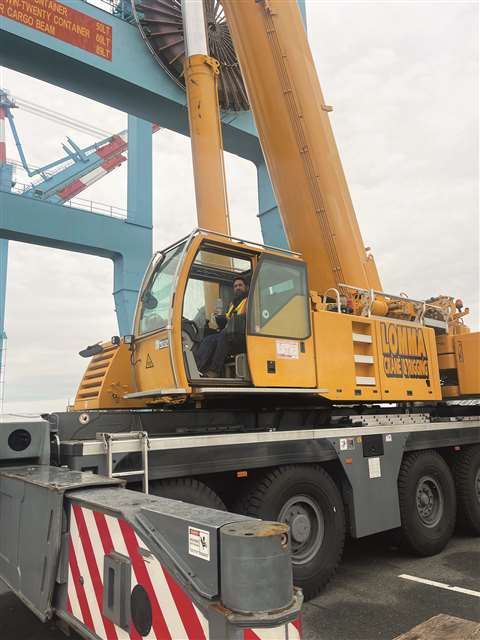Top tips for taking care of your crane operators
12 April 2022
Crane workers need maintenance checklists too.
For cranes to run well, it’s critical to take care of them. When equipment isn’t properly maintained, it becomes unsafe, breaks down and costs more money in the long run. People are the same way. If there are maintenance checklists to keep equipment safe, why not have maintenance checklists to keep people safe? Following are some ideas to consider.
 Lomma Crane & Rigging crane operator Al Unbekant stays hydrated while on the job.
Lomma Crane & Rigging crane operator Al Unbekant stays hydrated while on the job.
Physical health
There are four aspects to physical health that provide the largest return on investment, while simultaneously benefiting mental health.
Hydrate. To be adequately hydrated, people need to drink half their body weight in ounces of high-quality beverages, like water and herbal teas. Anything with caffeine, chemicals or sugar – like coffee, soda and juice – are dehydrating and do more harm than good. If a jobsite doesn’t provide water, bring a giant water bottle from home. A hydrated worker has better memory recall, and is better able to remember training and job tasks.
Sleep. The average person requires seven to nine hours of sleep every night. With early job start times, committing to this maintenance task requires a strict bedtime and the discipline to eliminate sleep disruptors, such as phones and televisions. Avoid drinking alcohol or caffeine late in the day. Both negatively impact sleep. A well-rested worker has better brain function. They’re more alert with better moods and get sick less often.
Fuel. Just as with equipment, put the wrong fuel in a person, and they won’t run right. The best fuel is real food that people from 100 years ago would recognize. If the ingredients on a food label require a science lab rather than a kitchen, then it’s the wrong type of fuel. A properly fueled worker has higher energy levels and is more likely to be at a healthy weight, which poses less risk for injury and incidents on jobsites.
Move. Movement has cardiovascular and metabolic benefits while boosting mood and being a natural antidepressant. The construction industry has a high suicide rate, so this checklist item deserves extra attention. Walking is one of the most accessible forms of exercise. Workers can walk the job as they ensure proper ground conditions and set up. Stretching exercises are also important.
Mental health
Following are simple but effective ways to look after mental health daily.
Give thanks. This is commonly known as a gratitude practice and requires a few seconds of thought. In the high-risk crane industry, a worker may give thanks for a job done safely, for the workers remaining unharmed and to themselves for showing up and doing their best. By shifting the mindset from have-not to have, they can remember what they have in their life and why life is worth living.
Breathe. Deep breathing improves the amount of oxygen to the brain, stabilizes blood pressure and reduces stress. A great breathing practice for crane workers is “box breathing,” which Navy SEALs do in high-stress conditions. Do this by inhaling for a count of four, retaining the breath for a count of four, exhaling for a count of four, holding the breath for a count of four and repeating.
Meditate. The mental and physical health benefits of meditating are numerous and well-studied. There are many apps to learn meditation, such as Headspace and Calm. But the idea of sitting in stillness is uncomfortable for some. Any activity that quiets the mind can be a form of meditation. Examples are fishing, hiking in nature or building something from scratch.
Serve. It’s common to hear about people dying shortly after they retire. When a person asks, “How am I serving others today?” there is a sense of purpose and belonging. A crane worker can focus on showing up to a job, working as a part of a team to keep others safe and helping to build something that will impact people for years to come.
By taking a proactive approach to health, crane workers and companies will operate at their best. A commitment to health requires constant maintenance, but it pays off with safer workplaces, reduced insurance costs and a better work environment.

Jennifer Gabel is chief wellness officer at Lomma Crane & Rigging and founder of Construct Your Health – constructyourhealth.com – a health and wellness program targeted to the construction industry.
STAY CONNECTED


Receive the information you need when you need it through our world-leading magazines, newsletters and daily briefings.



